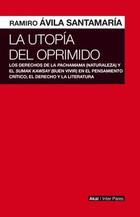
The alternatives lie in the imaginary, not in fantasy. This is demonstrated by Ramiro Ávila Santamaría, doctor of legal sociology and university professor, who offers utopia as a tool for transformation. Unlike the duty to be, which only runs in a sense of demand, the utopia is ambidextrous: it arises from the imaginary - the human marrow, from culture - to raise new social possibilities and then return to us to question us. Can the worldview of peoples and social struggles lead to politics, law, critical thinking?
The utopian method, as demonstrated in these pages, can be applied to describe and explain reality, social phenomena and even to analyze any form of representation. Through it it becomes possible to question any utopia - including that of capitalism and its ideas of progress or development - to propose possible alternatives in which all orders of life in society are ...read more







